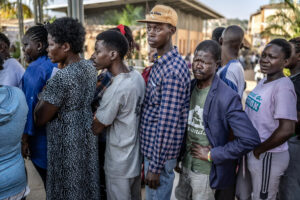MOGADISHU/WASHINGTON DC – The Somali Journalists Syndicate (SJS) and RFK Human Rights strongly denounce the trend of attacks on journalists amidst the worsening security environment in Somalia. Somali authorities must uphold their legal obligations to guarantee freedom of expression for journalists and all Somali citizens.
In recent months, freedom of the press in Somalia has significantly deteriorated, while security challenges continue to rise. The Al-Shabaab militant group has recently escalated its campaign on Mogadishu and surrounding areas, launching raids and planting bombs in key civilian areas. In response, the authorities announced a ban on any reporting concerning the security situation in Mogadishu, which has left a large information gap for Somali citizens.
This illegal ban on reportage on the security situation has been used as a pretext to suppress press freedom in Somalia. Earlier this month, Somali Police arrested Feisal Omar (Reuters) for reporting on a protest by the Somali Bantu minority community, and the directors of a local outlet, Shabelle Media, Abukar Sheik Mohamud and Mahmud Abdinasir Soofeeysane, for hosting an interview on insecurity in Mogadishu.
This recent trend began in February 2025 after journalists reported on the United States embassy’s security alert regarding imminent attacks in Mogadishu. The local police commissioner in Mogadishu threatened to detain “anyone who reports on security issues in a hot and dark cell with no lights.” On March 18, after an Al-Shabaab bombing targeting the Somali President’s convoy outside the presidential palace, which sadly claimed the life of journalist Mohamed Abukar Dabaashe, Somali police arrested nineteen journalists from both local and international outlets who were on the scene to report the news. In addition, the police raided and shut down the offices of Risaala Media Corporation without a warrant after Risaala Media’s reporting on the bombing. Five other journalists were arrested and taken to the local police station for interrogation before being released with a warning not to report on security issues.
On March 25, journalist Ibrahim Mohamed Mayow was forcibly disappeared by armed officers linked to the regional police commissioner after reporting on an Al-Shabaab attack in the town of Afgooye, outside of Mogadishu. Mr. Mayow was summoned by the police commissioner after he published a video showing the aftermath of the mortar attack. Although local journalists went to the Afgooye police station to inquire about his whereabouts, the station informed them that they did not have him in custody. SJS confirms that Mr. Mayow was held in an undisclosed location until March 28, when he was driven to Mogadishu and thrown out of the car. The Somali police, who were responsible for his abduction, never issued any statement regarding his kidnapping or release.
Even journalists who were reporting on issues unrelated to the security situation have been caught up in the net of repression. On March 15, after journalist Bahjo Abdullahi Salad reported on leftover food and waste being dumped in a neighborhood in Mogadishu, agents from the National Intelligence and Security Agency raided her home, arrested her, and interrogated her for four hours. Her report was seen as a criticism of the Prime Minister, who had attended an event nearby that contributed to the dumping, and she was only freed after other journalists protested her detention.
“We are deeply alarmed by the escalating attacks on journalists across Somalia and the worsening security situation facing the media. The recent attacks on journalists in Mogadishu by Somalia’s police and national intelligence (NISA) and the death of journalist Mohamed Abukar Dabaashe in an Al-Shabaab bombing in Mogadishu, which also claimed the lives of innocent civilians, is a tragic reminder of the dangers journalists face while informing the public,” said SJS Secretary General, Abdalle Mumin. “Somali authorities must end this culture of silencing critical voices and ensure journalists can work without fear of violence, arrest, or intimidation.”
“The ban on reportage around security issues is not a permissible limitation to the right to freedom of speech under human rights law,” said Ikechukwu Uzoma, senior staff attorney at RFK Human Rights. “Somali authorities must begin to see a free press as a critical part of the advancement of peace and security in the country—journalism is not a crime,” he added.



